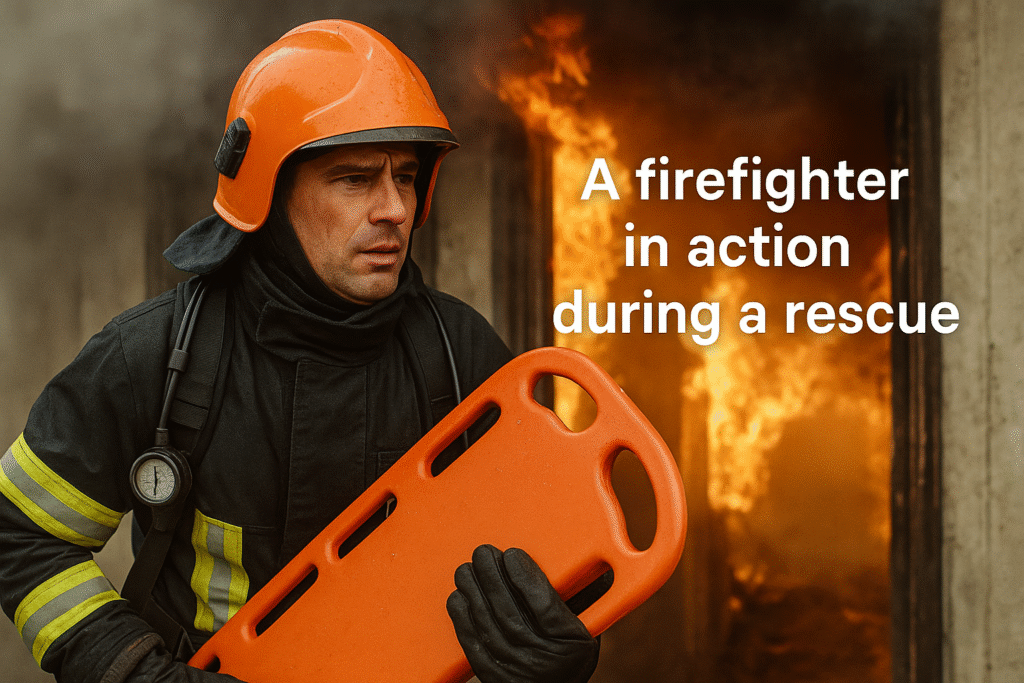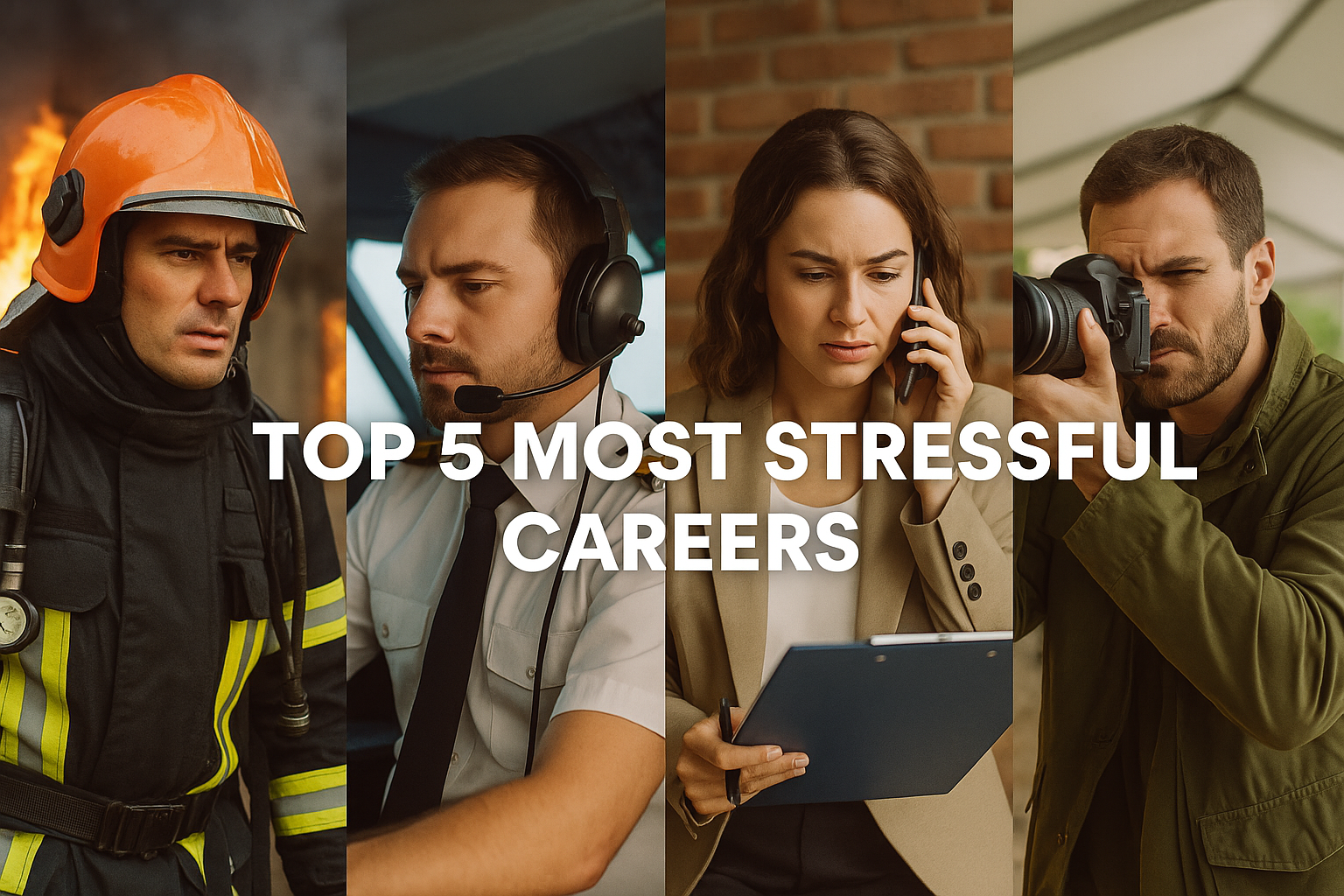In today’s fast-paced world, stress is practically a companion in every profession. But some careers push individuals to their mental and physical limits more than others. Whether it’s the pressure to save lives, meet tight deadlines, or maintain public safety, certain roles carry significantly higher stress levels.
If you’re considering a career change or just curious about what others endure daily, here’s a look at five of the most high-pressure jobs that demand extreme resilience, quick thinking, and emotional strength.

1. Firefighters: Always on the Frontline
Firefighters are often the first to arrive at scenes of chaos from towering infernos to car accidents and natural disasters. Their job isn’t just about putting out fires; it’s about protecting lives, property, and sometimes even calming terrified citizens in extreme conditions.
Why It’s So Stressful:
- Constant exposure to dangerous environments (smoke, flames, toxic chemicals)
- Unpredictable schedules and long shifts
- Heavy emotional burden, especially after tragic events
- Physically demanding work requiring peak fitness
Fast Facts:
- Median Annual Salary: $53,240
- Education Required: Fire Academy Training / EMT certification
- 2025 Employment Outlook: Projected 6% growth (U.S. Bureau of Labor Statistics)
Despite the risk, many firefighters view their role as a calling a passion for helping others during their worst moments.

2. Airline Pilots: Sky-High Pressure
Flying an aircraft may seem smooth on autopilot, but behind the scenes, pilots juggle intense responsibilities navigating turbulence, monitoring systems, handling emergencies, and ensuring passenger safety on every flight.
What Makes It Stressful:
- High responsibility for hundreds of lives at once
- Intense travel schedule across multiple time zones (leading to fatigue)
- Sudden weather or mechanical issues requiring immediate action
- Regulatory compliance and ongoing training requirements
Industry Stats:
- Median Annual Salary: $148,500
- Education Path: Bachelor’s degree + Commercial Pilot License + ATP Certification
- 2025 Job Growth: Estimated at 4% (slightly below average)
Pilots must maintain unwavering focus and decision-making ability no matter how exhausted or jet-lagged they are.

3. Police Officers: Guardians of Public Safety
Few professions demand such a complex mix of emotional intelligence, physical readiness, and legal understanding as law enforcement. Police officers are tasked with upholding laws, resolving disputes, and protecting citizens often in the most volatile situations.
Sources of Stress:
- Daily exposure to life-threatening situations
- Unpredictable public interactions from calming disputes to handling armed suspects
- High scrutiny from both the public and internal affairs
- Paperwork and legal accountability for every action
Role Snapshot:
- Median Salary: $66,020
- Required Training: High School Diploma + Police Academy + Background Check
- Projected Growth: 3% through 2025
Law enforcement professionals often face moral dilemmas, public criticism, and long-term psychological impact, which contribute to the job’s high stress levels.

4. Event Coordinators: Masters of Controlled Chaos
Organizing an event whether a conference, wedding, or product launch may seem glamorous, but it involves months of planning, negotiating, and troubleshooting. Event coordinators are expected to deliver perfection, often with limited resources and impossible deadlines.
Common Stressors:
- Managing multiple vendors, budgets, and timelines
- Handling last-minute cancellations or unexpected disasters
- Dealing with high-maintenance clients and emotionally charged environments
- Long hours, especially during the final days leading up to events
Key Numbers:
- Median Salary: $52,560
- Education Needed: Bachelor’s Degree in Hospitality or Business
- Outlook: Strong 8% growth due to rising demand for corporate and social events
Every successful event masks a whirlwind of logistical nightmares all orchestrated by someone calm under pressure.

5. Photojournalists: Capturing the World’s Tensions
While photographers might be associated with fashion shows and family portraits, photojournalists are often in the heart of conflict zones, natural disasters, or political unrest risking their lives to deliver truthful imagery to the public.
High-Stress Factors:
- Dangerous working conditions (war zones, riots, hazardous weather)
- Pressure to get the “perfect shot” under intense time limits
- Emotional toll of witnessing trauma firsthand
- Political or legal consequences in authoritarian regimes
Career Overview:
- Median Salary: $41,280
- Education Path: Degree or diploma in journalism/photography
- Job Outlook: Declining by 6% due to industry changes and digital disruption
Despite the decline in traditional media, experienced photojournalists continue to be a lifeline in humanitarian reporting, shining a lens on the unseen truths.

How to Cope With Job-Related Stress (No Matter Your Career)
Even if your job isn’t listed above, work-related stress is still real and manageable. Here are proven, research-backed methods to help you take back control of your work life:
1. Build a Support System at Work
Don’t isolate yourself. Talk to trusted colleagues about shared challenges. Sometimes, hearing “me too” is all you need to feel less overwhelmed.
2. Learn Prioritization and Time Blocking
Overloading your schedule leads to burnout. Start your day by listing top 3 priorities. Use time blocks and breaks to avoid back-to-back pressure.
3. Develop Physical and Mental Wellness Routines
Exercise, mindfulness, and even proper sleep can significantly reduce cortisol levels. Apps like Headspace or Calm can help with daily stress management.
4. Consult a Mental Health Professional
A counselor or therapist can help you process emotions, develop coping strategies, and prevent long-term anxiety or depression from taking root.
5. Take Actual Breaks
Step away from your desk for lunch. A short walk or change of scenery can help reset your nervous system and boost productivity.
Final Thoughts: Is Stress Inevitable or Preventable?
Some stress comes with the territory, especially in careers that require constant vigilance, responsibility, and sacrifice. But chronic stress isn’t sustainable, even for the toughest professionals.
Whether you’re chasing a dream career or just surviving your 9 to 5, recognizing your limits, prioritizing mental health, and taking preventative measures can make all the difference.
FAQs
What are the most stressful careers today?
Some of the most stressful careers include firefighters, airline pilots, police officers, event coordinators, and photojournalists due to high-pressure responsibilities, unpredictable situations, and life-or-death stakes.
Why is being a firefighter considered so stressful?
Firefighters constantly face life-threatening emergencies, work irregular hours, and bear the emotional burden of saving lives in hazardous conditions.
Is stress avoidable in high-pressure jobs?
While stress is inevitable in demanding careers, it can be managed through prioritization, counseling, physical wellness, and building support systems at work.
How can I reduce stress in my current job?
Use time management techniques, practice mindfulness, consult a therapist, and take proper breaks to reduce job-related stress and improve mental clarity.
Are there careers that are less stressful than others?
Yes, careers like librarianship, data entry, or technical writing often involve lower interpersonal demands and less physical or emotional risk, making them less stressful.

